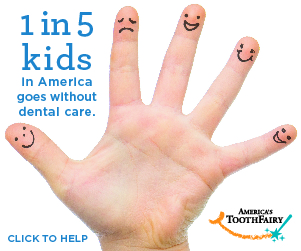Red Flags for Poor Oral Health in Your Child
Certain oral health conditions that appear during your child’s growth and development could be red flags for poor oral health. It is important to seek the advice of a dentist if you notice these warning signs.
Nursing Bottle Syndrome: Also known as baby bottle tooth decay or nursing caries, nursing bottle syndrome can result when a baby constantly takes in milk, formula, breast milk, fruit juice or sugar water – just about any liquid containing sugar. For example, sleeping throughout the night with a bottle of liquid containing sugar increases the baby’s likelihood for developing caries. Sugar remaining on the teeth may encourage growth of bacteria that can cause tooth decay, an abscessed tooth or infection that may spread to other areas of the body. It isn’t necessarily the amount of sugar that a baby is exposed to (though this plays an obvious role); rather, it is the duration of time during which a baby’s teeth are exposed to sugar.

Dentists recommend that you give your baby a bottle of water or a pacifier instead of a sugary substance when your child needs comfort and at bedtime. Stop using a bottle and shift to a “sippy cup” when your dentist recommends it – often by age one.
Decayed or Missing Baby Teeth: Baby teeth serve as a pattern for the placement of permanent teeth. Decayed or missing baby teeth may result in crooked or misaligned permanent teeth, which can, in turn, cause a host of problems.
Children may have difficulty chewing with misaligned teeth. It may also be challenging for a child to maintain proper dental hygiene, fostering tooth decay, periodontal disease or premature tooth loss. Misaligned teeth can also interfere with the temporomandibular joint (TMJ), which connects the lower jaw to the skull. This interference may result in pain and discomfort as an adult. Dentists may use space maintainers so that surrounding teeth remain in alignment and do not become crooked.
Check out some more facts about pediatric tooth decay
Thumb Sucking and Lip Sucking: Thumb sucking is a normal and healthy activity that provides comfort and security for an infant.
That said, thumb sucking after permanent teeth have erupted (usually by five years of age), can create many problems. The child’s supporting bone structure may shift, causing misalignments in the jaw and roof of the mouth. The child’s teeth may shift, resulting in an overbite or protrusion of teeth. Finally, the results of inappropriate thumb sucking can affect speech, making it difficult to pronounce certain words. The extent of damage to the mouth depends on the regularity and intensity of thumb sucking.
A child sucking the lower lip either by using the upper teeth or during thumb sucking may face the same problems as a thumb sucker. Additionally, when teething, babies will often put their fingers in their mouth.
Typically, children stop thumb and lip sucking by age five. If not, reward your child when he or she doesn’t thumb or lip suck. Thumb sucking is meant to provide comfort and can be indicative of an underlying issue your child is dealing with. Try to understand the issue prompting your children to suck their thumb or lip, and you may be able to correct the underlying problem.
Tongue Thrusting: Tongue thrusting is a condition caused as a result of the chronic pressing of the tongue against the lips with a force that can lead to the protrusion of teeth. Speech pathologists can help change your child’s swallowing pattern and build on the chewing muscles to stop tongue thrusting, averting long-term dental problems.
Poor Nutrition: Choose fruits and vegetables for snacks, including melons, pears, celery and cucumbers. Limit sugary, sticky foods such as raisins, granola bars, jelly beans and syrup. If you offer sugary, sticky snacks, do so only after a meal. Usually saliva flow increases after meals, making it easier to wash away sugary, sticky food debris.
Always clean teeth after every snack or meal. Give your child water as often as possible. Do not offer sugared gum; instead, choose sugar-free or xylitol-sweetened gum.
Oral Health of the Parents: If a child’s parents suffer from oral diseases like periodontal disease or tooth decay, the child faces an increased risk of similar oral health problems. Bacteria from a parent’s mouth can be transferred to the child’s mouth when giving kisses, sharing food, etc.![]()
Next, go to:



